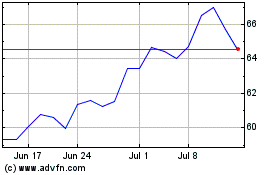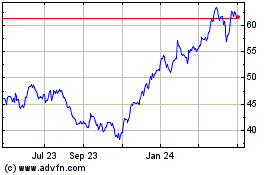Citigroup Posts Higher Profit But Trading Revenue Falls -- 2nd Update
January 14 2019 - 9:59AM
Dow Jones News
By Telis Demos
Citigroup Inc. bounced back from a year-earlier loss, but its
vital trading business struggled under tough market conditions in
the fourth quarter.
The bank's net income was $4.3 billion in the latest quarter,
versus a loss of $18.9 billion a year earlier, when it took a large
one-time charge related to the 2017 corporate tax cut.
But overall revenue at the bank was $17.1 billion, down 2% from
a year ago. That decline was led by a 14% drop in the trading
business, where revenue fell to $2.6 billion.
December's volatility was especially tough for banks' trading
desks. Many of their clients stepped back from the market and
low-cost algorithms took over. Fixed-income trading, normally a
stalwart for Citigroup, was off by 21% from a year earlier.
The performance could herald weakness across banks' trading
desks, especially peers JPMorgan Chase & Co., which reports
earnings Tuesday, and Bank of America Corp., which reports on
Wednesday.
Goldman Sachs Group Inc. and Morgan Stanley, which also report
this week, rely more heavily on equity trading but could also feel
the effects of the market gyrations. Citigroup's equity-trading
revenue rose 18% from a year ago, to $668 million, though that was
bolstered by removing a one-time loss from the fourth quarter of
2017.
A 4% cut in expenses, to $9.9 billion, plus a net improvement to
its credit risk and overall lower tax rates boosted the bank's core
profitability.
Taking out the tax write-off from a year ago, and removing a
small one-time tax-related gain in the fourth quarter, net income
grew 14% from a year ago, to $4.2 billion.
Adjusted earnings per share were $1.61. Analysts polled by
Refinitiv expected $1.55 a share.
The 2017 charges related to a decline in the value of deferred
tax assets the bank accumulated during the financial crisis due to
the tax-law changes.
"The real economy is doing well," said Citigroup Chief Financial
Officer John Gerspach in a call with reporters. "Then you've got
what I'll call the financial economy...I think there's a good deal
of concern around the world as to how do we exit this period of
quantitative easing," he said, referring to the Federal Reserve's
move to raise rates and reduce the availability of easy credit.
"What remains to be seen is whether the financial economy has an
impact on the real economy in 2019," he added.
Citigroup shares were down 1.1% in premarket trading.
Investor concern about the impact of slowing global growth on
the New York bank's vast international business has weighed on
Citigroup's stock in recent months. Its shares have fallen 26% over
the past 12 months, while the broader KBW Nasdaq Bank Index is down
about 20%.
Total global revenue from Asia was down 5% from a year ago, to
$3.5 billion. Consumer banking in Asia was off by 4%, and
institutional revenue was off by 5%.
That is the bank's second-biggest region behind North America,
where revenue was also down, by 2%, to $8.1 billion.
One continued strength was the bank's treasury and trade
services unit, which serves multinational corporations around the
world. Revenue in that unit was up 7% to $2.4 billion despite
worries about trade conflicts.
The U.S. consumer's enduring stability was another positive.
Revenue in the bank's credit-card business was up 1% from a year
ago, to $5.1 billion.
The bank's core profitability ratio, return on equity, fell from
the third quarter, to 9.0% from 9.6%. That still lags behind most
of its peers, but the ratio has been trending higher in recent
quarters, as the bank has returned capital to shareholders,
including a $5.8 billion payout in the fourth quarter.
Write to Telis Demos at telis.demos@wsj.com
(END) Dow Jones Newswires
January 14, 2019 09:44 ET (14:44 GMT)
Copyright (c) 2019 Dow Jones & Company, Inc.
Citigroup (NYSE:C)
Historical Stock Chart
From Mar 2024 to Apr 2024

Citigroup (NYSE:C)
Historical Stock Chart
From Apr 2023 to Apr 2024
